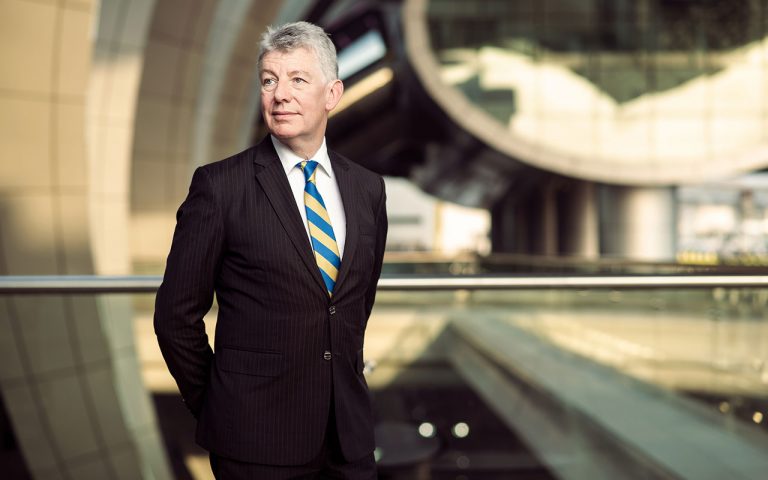A robust and passionate case for the UAE to be taken off the UK’s Red List has been delivered by Paul Griffiths, CEO of Dubai Airports, who remains “mystified” that the Emirates remain on the no-fly zone.
In a wide-ranging interview with Arabian Business, Griffiths outlined his hope that the status may soon change and laid out the comprehensive reasons for a rethink, including Dubai Airports’ ability to improve medical security for the UK compared to other destinations, some already on the UK’s Green List.
And he urged the UK government to look again at the data, which he believes should be the primary factor in determining the UAE’s travel status.
His comments come after Arabian Business wrote an open letter to Grant Shapps, the UK’s Secretary of State for Transports, urging him to rethink the UAE’s Red List status so thousands of British families who live in the Emirates could reconnect with their loved ones, and so business and tourism travel could begin again.
“We’re hopeful for change obviously, and the change can’t come too soon, in my opinion,” said the CEO. “If you look at the data, the data on infection, the data on our vaccine program, if you look across the world, there is an absolute inverse correlation between infection rates and vaccination program. And if you look at Israel, if you look at the UK, if we look at the USA, everyone’s doing extremely well.
“The UAE is only second to Israel. So if, as we’ve been told by the UK government, the decision is data-based, then there is absolutely no reason why the UK government shouldn’t reconsider its position and put us on at least the Amber, if not the Green List straightaway. The next decision point I understand is Friday, [May] 28 so we haven’t got long to wait, before we’ll know whether our status has been changed.”
 Sir Tim Clark, president of Emirates Airline
Sir Tim Clark, president of Emirates Airline
In April, Shapps told an online ConservativeHome event that the UAE’s status as a global transit hub, with particular regard to Dubai, was one of the issues contributing to the Red List status, a statement that Sir Tim Clark, president of Emirates Airline told the UK’s Independent newspaper “made no sense”.
That’s a sentiment that Paul Griffiths agrees with, forensically answering that claim saying the logic does not hold up.
“First of all, I cannot understand why us being a global transit hub has been branded as an additional risk. I would suggest that actually everything we’ve done, from the hospital operating theatre levels of cleanliness we’ve tried to put within the airport, the plexiglass screens in front of people involved in customer service, all of the other measures sees the staff PPE, the rollout of vaccination program amongst staff which has been highly intensive and the touchless immigration and checking processes we’ve introduced, I would suggest that our status as an airport, in terms of our medical security is amongst the best in the world, if not the best in the world,” said the CEO.
“We’ve just been accredited by Airports Council International as having their health accreditation certificate as being amongst the most clinically sanitized of all airports, so I don’t see what we could be doing.
“The logic that as us as a transit hub just holds no ground whatsoever because the cancellation of services between the UK and the UAE has forced people entering the UK to go via third party hubs, more flights, more airports, more mixing with people. So I would argue that the risk has actually increased through the cessation of flights rather than decreased.
“If you look at the positivity rates amongst UAE residents arriving in the UK, that have gone back through other points and entered hotel quarantine, the positivity rate is far lower than a lot of countries that are on the Red and Amber lists and probably the Green List as well. And that’s according to NHS data.
“The UK is in possession of all these facts. So hopefully, that’ll lead to a better decision in the days and weeks to come.”
While both Arabian Business’ open letter, and Griffiths, understand the UK’s desire to protect its progress in the fight against coronavirus, the Dubai Airports boss said that DXB could actually help the long-time friend an ally by improving the medical security of passengers arriving in the UK.
He said: “We’ve got three weapons in the battle against Covid-19. First of all, obviously, there’s the testing, and we’ve rolled out comprehensive PCR testing on arrival at the airport. And obviously, testing on departure is a mandatory requirement.
“Now with the vaccination program very much in evidence now,” he said.
The UAE has administered over 12 million doses so far, delivering 122 doses per 100 people. Approximately 61 percent of the population is completely vaccinated. Global vaccination rates, on average, stand at 21 doses per 100 people.
70,176 doses of the #COVID19 vaccine were given in the last 24 hours, to reach 12,104,525 as a total number of doses and with a rate of 122.39 doses per 100 people as vaccine distribution. #TogetherWeRecover
— NCEMA UAE (@NCEMAUAE) May 23, 2021
“So we’ve got past the critical mass of most countries… so we’re in incredibly good shape from that perspective.
“And the third point is that we could also work hand in hand with the EU, the UK, and say, we will screen passengers to make sure that they’re not arriving in Dubai from a Red List country within the 10 or 14 days prior to travel from Dubai.
“So we’ve got those three things that we’ve tried to engage with the UK Government to suggest we could put those in place, and actually increase the medical security of people coming to the UK by putting those in place. Now a lot of Green List countries don’t have the ability to put those particular criteria together. So we are still mystified as to why we haven’t had a more proactive and practical dialogue to get off that Red List.
“We’re still mystified as to why we were ever on it in the first place.”








